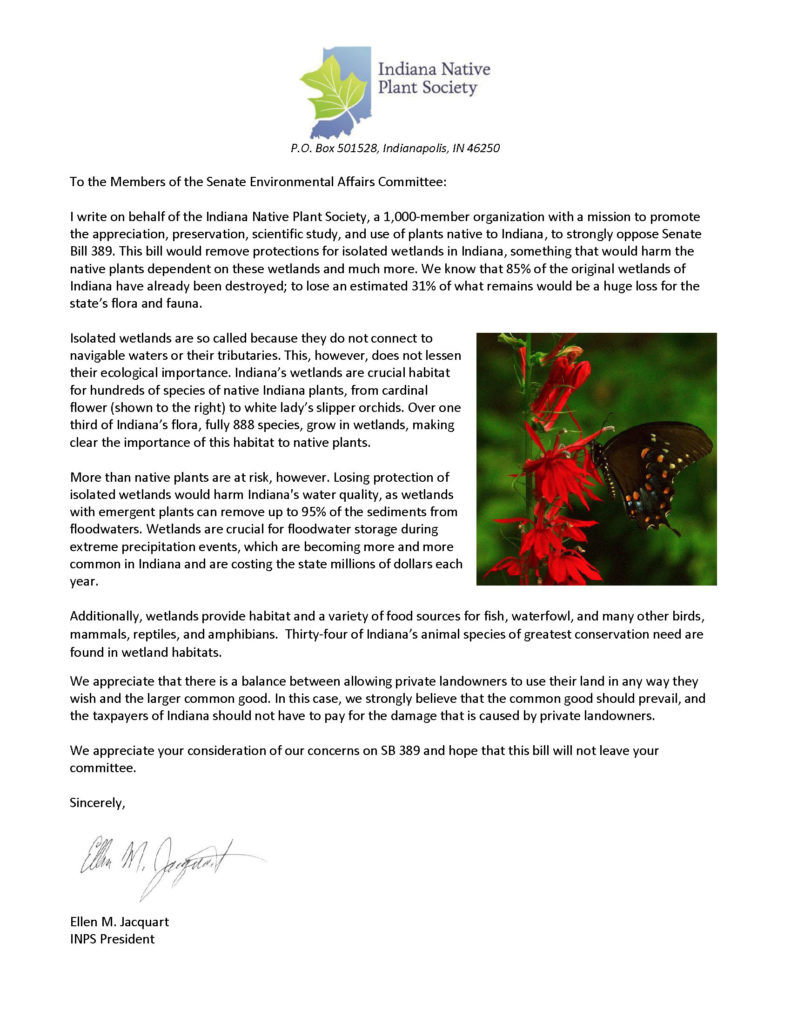Urge Governor to Veto SEA 389
Update from Hoosier Environmental Council:
From: Indra Frank <IFrank@hecweb.org>
Sent: Tuesday, April 20, 2021 3:14 PM
To: Indra Frank <IFrank@hecweb.org>
Subject: Please join a letter urging the Governor to veto SEA 389
Dear Wetland Friends,
I am writing to thank you for your efforts on behalf of wetlands and to ask you to sign on to a letter urging the Governor to veto the anti-wetlands bill, SEA 389.
First, thank you so much for all of your efforts to defeat the anti-wetlands bill, SB 389. The many, many calls and emails to legislators made a difference. Ultimately, we didn’t sway enough legislators to get the milder compromise or to defeat the bill, but the massive outpouring of support for Indiana’s wetlands meant the bill passed with a narrow margin. That may set the stage for more changes in the future. Please thank those that voted ‘no’!
Second, the request for a veto. SB 389 has passed the General Assembly, so it is now Senate Enrolled Act 389 or SEA 389. It eliminates protection for Class I wetlands and significantly reduces protection for Class II. Since IDEM estimates Class I and II together make up more than 90% of the state-jurisdictional wetlands, this bill would do substantial damage. That’s why the organizations listed below worked together to draft the attached letter urging Governor Holcomb to veto SEA 389. We plan to deliver it to the Governor Monday, April 26.
Please let me know by noon Sunday, April 25, if your organization would like to sign on to the letter and exactly how the name of your organization should be listed. Feel free to share this message with others.
If you would like to send your own message to the Governor, please feel free to borrow material from this letter. You can contact the Governor as follows:
By email: govholcomb@gov.in.gov
By phone: 317-232-4567
By mail: The Honorable Eric Holcomb, Governor of Indiana
Office of the Governor
Statehouse
Indianapolis, Indiana 46204-2797
With hope,
Indra
- The group authoring the letter included representatives of the Hoosier Environmental Council, the White River Alliance, the Nature Conservancy of Indiana, the St Joseph River Basin Commission, Indiana Wildlife Federation, Indiana Chapter of Backcountry Hunters and Anglers, Indiana Forest Alliance, Conservation Law Center, Audubon Society, Ducks Unlimited, Save the Dunes, and the Indiana Association of Soil and Water Conservation Districts.
Indra Frank, MD, MPH
Environmental Health & Water Policy Director
Hoosier Environmental Council
317-292-7311
Happy Earth Month! Now is the perfect time to become an HEC member: All first-time donor gifts will be matched through the month of April. Any gift amount makes you a member. Donate safely and securely at hecweb.org/donate. Thank you!
The INPS Council and Board voted to oppose Senate Bill 389 which would repeal protections for isolated wetlands in Indiana.
Synopsis
From Indiana Wildlife Federation, this synopsis: A bill recently introduced in the Indiana Senate (SB 389) would remove significant protections for state-regulated isolated wetlands.
This bill will negatively impact Indiana’s few remaining wetlands. Wetlands are invaluable habitat that support countless species of Indiana birds, mammals, reptiles, amphibians, and pollinators. They are key to sustainable, thriving habitats that also protect our drinking water and help buffer our communities against flooding.
This bill is a direct and dangerous threat to wildlife and water quality. Long ago, wetlands made up about 24% of the Indiana landscape. Today, more than 85% of those wetlands acres have been lost.
According to the US EPA: “Wetlands play an integral role in the ecology of the watershed. The combination of shallow water, high levels of nutrients and primary productivity is ideal for the development of organisms that form the base of the food web and feed many species of fish, amphibians, shellfish and insects. Many species of birds and mammals rely on wetlands for food, water and shelter, especially during migration and breeding.Wetlands’ microbes, plants and wildlife are part of global cycles for water, nitrogen and sulfur. Furthermore, scientists are beginning to realize that atmospheric maintenance may be an additional wetlands function. Wetlands store carbon within their plant communities and soil instead of releasing it to the atmosphere as carbon dioxide. Thus, wetlands help to moderate global climate conditions.”
Here is the INPS letter that president Ellen Jacquart sent to the Committee on January 22, 2021, opposing SB 389.


